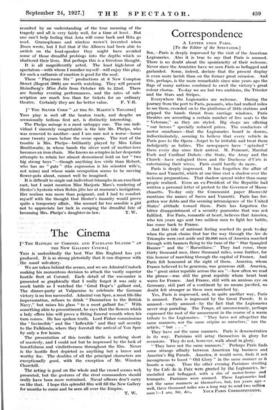Correspondence
A LETTER FROM PARIS.
[To the Editor of the SPECTATOR.] SIR,—Paris is deeply impressed by the visit of the American Legionaries. Also it is true to say that Paris is amused. There is no doubt about the spontaneity of their welcome. Never since the Armistice have we seen Paris so beflagged and garlanded. Some, indeed, declare that the present display is even more lavish than on the former great occasion. And this, perhaps, is the more remarkable since nine years ago the flags of many nations combined to swell the victory's great colour chorus. To-day we see but two emblems, the Tricolor and the Stars and Stripes.
Everywhere the Legionaries are welcome. During the journey from the port to Paris, peasants, who had walked miles to see them, crowded on to the platforms of little stations and gripped the hands thrust from carriage windows. Paris theatres are according a certain number of free seats to the " Veterans," as they are styled. Big shops are offering " our heroes " specially reduced prices. The conductors of motor omnibuses—that the Legionaries board in dozens, indiscriminately, seeming to believe that every vehicle in Paris goes to the Opera—forget to be irritable and treat them indulgently as babies. The newspapers have " splashed " them every day since their arrival. M. Poincare, Marshal Foch and Cardinal Dubois—the State, the Army and the Church—have eulogized them and the Duchesse d'Uzes is entertaining their wives. Paris could hardly do more.
Paris is deeply impressed. It has forgotten the affair of Sacco and Vanzetti, which at one time cast a shadow over the welcome preparations. That shadow spread wider than many people realized. Even an ex-President of the Republic had written a personal letter of protest to the Governor of Massa- chusetts. To-day only the Communist paper -Humanite mentions the names of Sacco and Vanzetti. Paris has for- gotten war debts and the seeming intransigence of the United States' attitude toward them. Paris has forgotten the bitter disappointment of a security guarantee that was not fulfilled. For Paris, romantic at heart, believes that America, who ten years ago sent two million men to fight her battle, has come back to France.
And this tide of national feeling reached"its peak to-day when the great chains that bar the way through the Are de Triomphe were cast aside and 30,000 men of America marched through with banners flying to the tune of the " Star Spangled Banner " and the " Marseillaise." They had come, these thirty thousand men, three thousand miles, some further, for this honour of marching through the capital of France. And Paris felt honoured at the sight of them. America, whom France believed to be generous, was generous still. America, the " great sister republic across the sea "—how often we read the phrase—was still the great republic whose heart beat warm for France. And France, still with an anxious eye on Germany, still part of a continent by no means pacified, no doubt felt stronger as these men marched by.
Yes, Paris is impressed, and, in quite another way, Paris is amused. Paris is impressed by the Great Parade. It is amused—vastly amused—by the fact that the Legionaries never stop parading. The Temps, all unconsciously, perhaps expressed the root of the amusement in the course of a warm tribute to the Legionaries. " They have not altogether the same manners, nor the same origins as ourselves," ran the article, " but . . "
They have not the same manners. Paris is demonstrative in its way. Parisians will array themselves in glory for occasions. They do not, however, walk about in glory.
" They have not the same manners." Perhaps Paris finds some strange affinity between American big business and America's Big Parade. America, it would seem, finds it not incongruous to boost " Old Glory " in the same manner as it boosts a soap. Thus the other evening Parisians strolling by the Café de la Paix were greeted by the Legionaries, be- medalled and beflagged, with a din of motor-horns and trumpets. Parisians were amused. These Legionaries had not the same manners as themselves, but, ten years ago—. well three thousand miles wasyoavloan Limy ctoonseREsndrtowNopmEmoa men !—I am, Sir, &c.,










































 Previous page
Previous page